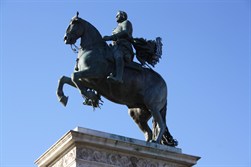Philip IV of Habsburg
 Philip IV of Habsburg (1605-1665) reigned over Spain and the Spanish dominions in Europe and America from 1621 to his death. During his reign, Spain underwent a severe crisis due to harsh and unrealistic military commitments, which led to frequent bankruptcies. The style of government of Gaspar de Guzmán, Count-Duke of Olivares (1587-1645), the powerful favourite of Philip IV, who exercised, in fact, the king’s power for over twenty years soon came under attack. Olivares tried in vain to re-establish Spanish hegemony in Europe and to remedy the financial crisis of the monarchy: after the expiration of the Truce period of twelve years (1609-1621), he resumed the war against the United Provinces; he worked alongside the Austrian Habsburgs in the Thirty Years’ War; at the same time, he sought to restore the finances of the state, by redistributing the tax burden between the different kingdoms. For this purpose he promoted a project called “the union of the armies” (1624), which provided for the distribution of military spending, previously supported only by Castile, among all the territories of the Crown. This initiative led to a wave of revolutions, during which major kingdoms and territories of the Monarchy violently claimed their ancient freedom and autonomy: Portugal and Catalonia rebelled in 1640, Palermo and Naples (the so-called Masaniello revolt) in 1647-1648. Even after the dismissal of Olivares in 1643, the military decline of the monarchy did not stop. Having permanently lost Portugal, he had to give up all claim of sovereignty over the United Provinces, while the long conflict with France was resolved, after the Peace of the Pyrenees (1659), with the end of Spanish dominance in Europe.
Philip IV of Habsburg (1605-1665) reigned over Spain and the Spanish dominions in Europe and America from 1621 to his death. During his reign, Spain underwent a severe crisis due to harsh and unrealistic military commitments, which led to frequent bankruptcies. The style of government of Gaspar de Guzmán, Count-Duke of Olivares (1587-1645), the powerful favourite of Philip IV, who exercised, in fact, the king’s power for over twenty years soon came under attack. Olivares tried in vain to re-establish Spanish hegemony in Europe and to remedy the financial crisis of the monarchy: after the expiration of the Truce period of twelve years (1609-1621), he resumed the war against the United Provinces; he worked alongside the Austrian Habsburgs in the Thirty Years’ War; at the same time, he sought to restore the finances of the state, by redistributing the tax burden between the different kingdoms. For this purpose he promoted a project called “the union of the armies” (1624), which provided for the distribution of military spending, previously supported only by Castile, among all the territories of the Crown. This initiative led to a wave of revolutions, during which major kingdoms and territories of the Monarchy violently claimed their ancient freedom and autonomy: Portugal and Catalonia rebelled in 1640, Palermo and Naples (the so-called Masaniello revolt) in 1647-1648. Even after the dismissal of Olivares in 1643, the military decline of the monarchy did not stop. Having permanently lost Portugal, he had to give up all claim of sovereignty over the United Provinces, while the long conflict with France was resolved, after the Peace of the Pyrenees (1659), with the end of Spanish dominance in Europe.
Read more:
-
A. Domínguez Ortiz, Política y Hacienda de Felipe IV, Madrid 1960.
-
R.A. Stradling, Philip IV and the Government of Spain, 1621-1665, Cambridge 1988.
-
J. Alcalá-Zamora y Queipo de Llano (coord.), Felipe IV. El hombre y el reinado, Madrid 2005.
